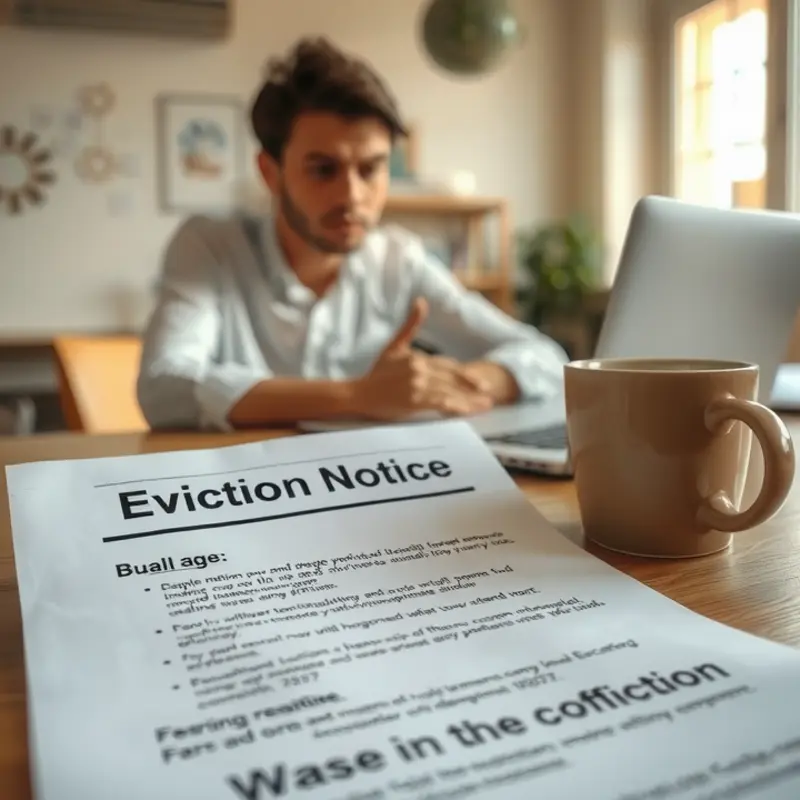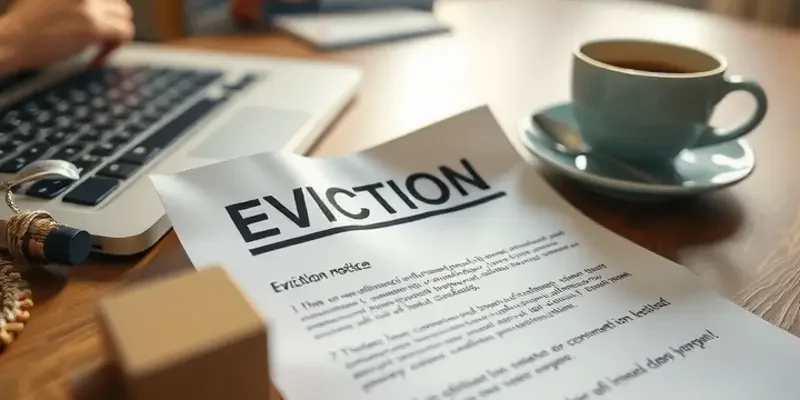Receiving an eviction notice can feel overwhelming and alarming, especially for young professionals, first-time renters, students, and families striving for stability. Whether you’re renting your first apartment or establishing a home with loved ones, understanding your legal rights and options is essential in navigating this difficult time. Knowing what steps to take immediately after receiving an eviction notice can help you protect your interests and potentially prevent loss. This guide aims to demystify the legal process following an eviction notice, outlining actionable steps tailored for individuals from diverse backgrounds seeking clarity and resolution. Here, we aim to empower you with the knowledge you need to respond effectively and ensure you can move forward with confidence, regardless of your circumstances.
Understanding Your Eviction Notice: Know Your Rights

Receiving an eviction notice can be daunting, but understanding its contents is vital in defending your rights. The United States recognizes several types of eviction notices, each with specific implications and timelines. Learning the meanings of these documents and how to respond can make a significant difference in your situation.
Eviction notices are legal documents that landlords use to inform tenants of the termination of tenancy. The most common types of notices include the “Pay or Quit” notice, the “Cure or Quit” notice, the “Unconditional Quit” notice, and the “Notice to Quit.” Each one serves a distinct purpose, and knowing the difference is essential.
A Pay or Quit notice is typically issued when there is a past due rent payment. This notice gives you a certain period, often three to five days, to pay the overdue rent or vacate the premises. If you receive this notice, immediately verify your rent records. If you find discrepancies, communicate with your landlord and try to resolve the issue.
The Cure or Quit notice is issued when a tenant violates a term of the lease agreement other than rent payment. Common violations might include unauthorized pets or excessive noise. Upon receiving this notice, you generally have a set period to rectify the issue or face eviction proceedings. Clarifying the specifics of the alleged violation can often lead to a satisfactory resolution.
An Unconditional Quit notice is the most severe. This notice demands that you vacate the property without any opportunity to fix a violation. It is typically reserved for repeated offenses, illegal activities, or severe abuse of the rental unit. If you receive such a notice, consulting legal assistance promptly is crucial, as these cases can escalate quickly.
Finally, a Notice to Quit is often the most straightforward, indicating that the landlord wants you to leave, usually at the end of your lease term or if the property is going through significant changes, like a sale. Unlike other notices, this does not necessarily indicate misconduct but requires attention to exit requirements and timelines.
Understanding legal timelines is also critical. Response periods can differ depending on state laws and the type of notice received. It’s important to retain copies of all correspondence and document any communications between you and your landlord. This evidence could be key if negotiations or legal proceedings become necessary.
In the U.S., tenants have legal rights reinforcing their safety and fairness in housing arrangements. Familiarize yourself with your lease terms and local landlord-tenant laws to better advocate for yourself. States like California and New York have specific tenant protections you should explore if you reside there.
While grappling with eviction, remember there are resources available. Legal aid societies, tenants’ unions, and housing advocates can offer guidance and support. For additional details on lease amendments and dispute resolution, refer to this comprehensive guide on documenting lease amendments.
By understanding eviction notices and your rights, you can take informed steps to address the situation. Stay vigilant, seek support, and keep your options open throughout the process.
Steps to Take: Navigating the Eviction Process

Receiving an eviction notice can be daunting, especially for young professionals and families striving to maintain stability. The first step is to remain calm and focus on understanding the situation. Begin by reviewing the eviction notice carefully, noting the type of eviction and deadlines involved. Following this, it’s crucial to communicate openly and promptly with your landlord. Contact your landlord to discuss the reasons behind the eviction and explore possible solutions, such as a payment plan. Demonstrating good faith and willingness to resolve the issue can sometimes prevent further escalation.
Gathering necessary documents is an essential process. Compile all relevant paperwork, including the lease agreement, any correspondence with your landlord, payment receipts, and records of lease amendments. If you’re unfamiliar with the concept of lease amendments, documenting lease amendments can provide further clarity on their importance and implications.
Seeking legal advice is advisable, even if you believe the eviction notice is justified. Legal professionals can offer guidance tailored to your local laws and highlight any potential defenses you might have. Many non-profit organizations and local agencies offer free or low-cost legal advice to those facing eviction.
Consider mediation or negotiation with your landlord. Mediation services can help facilitate a productive dialogue between you and your landlord to find mutually agreeable solutions, potentially preventing the need for court proceedings. If financial difficulties have led to missed rent payments, propose a payment plan that aligns with your budget.
Understanding any potential defenses is important if your case goes to court. Common defenses include incorrect notice procedures, retaliation, discrimination, or violation of tenant rights. Be prepared to present your case distinctly, supported by the documentation you’ve gathered.
In addition to these steps, actively explore local housing assistance resources. Local housing authorities often provide emergency rental assistance, housing counseling, or relocation support. Research available programs in your area and apply as soon as possible, as these resources might be limited.
By efficiently managing these steps and utilizing available resources, you can enhance your stability during this challenging time. Every action taken is a stride towards resolving the uncertainty and securing your housing situation effectively.
Final words
Facing an eviction notice can be daunting, but understanding the intricacies of your rights and the actions you can take is crucial for reclaiming your peace of mind. By knowing how to interpret your eviction notice and determining your next steps, you can navigate this difficult situation more effectively. Remember: you’re not alone. Utilizing community resources, seeking legal advice, and maintaining open communication with your landlord can make a significant difference. Embrace this opportunity to learn and grow, turning this challenge into a stepping stone toward a brighter living situation. Your future home can still be a place of stability and happiness.









